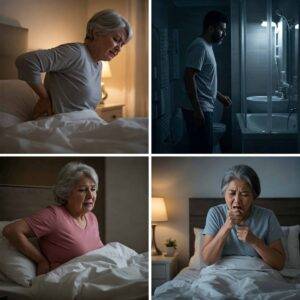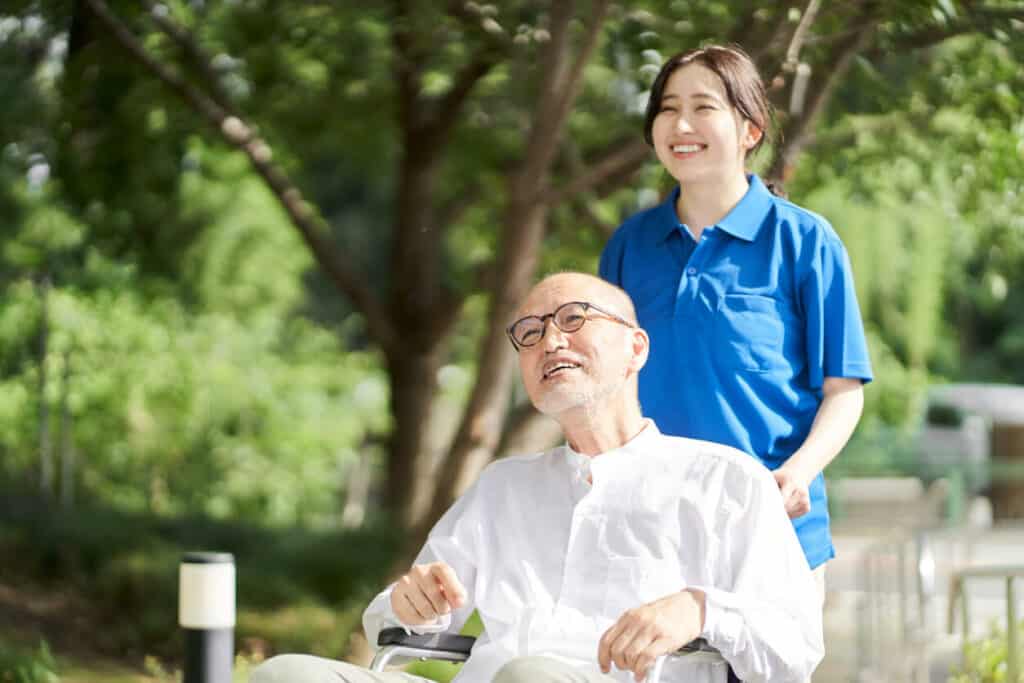
For many people, caregiving gives their life a purpose. They find fulfillment in taking care of a relative or a senior in need. It sounds impressive — however, caregiving is like any other job that can result in stress after some time.
It can be exciting when you’re just getting started, but eventually, it becomes mundane and stressful. When it does, you become aware of the increasing difficulties of caring for a loved one. But you still do it anyway until stress begins to take a toll on your mental, emotional, and physical health, leading to caregiver burnout.
What Is Caregiver Burnout?

Burnout is a state wherein caregivers feel extreme exhaustion and experience harmful health symptoms, leading to poor quality of life. Burnout caregivers are physically, emotionally, and mentally drained to the point that they can no longer sustain their caregiving responsibility. They become unfit for the role as they turn out depressed, excessively fatigued, and in despair.
Caregiver stress and burnout manifest in various ways, such as experiencing a mental or behavioral symptom, which 67% of unpaid caregivers for seniors have reported.
Caregiver burnout is preventable and it starts by knowing the early symptoms and addressing them without forgoing the care needs of the people who rely on you for care.
Signs of Caregiver Burnout

Unlike office jobs where you complete processes and tasks, caregivers deal with people who often have complex health conditions, disabilities, or cognitive impairments. Hence, the impact of burnout is more debilitating to caregivers, especially informal caregivers who didn’t receive skills training.
If you’re a new family caregiver, preventing burnout is a fundamental skill you must learn. The first step to avoiding it is to recognize the common signs. Indications of caregiver burnout are visible and anyone can observe the physical, emotional, and behavioral symptoms.
Caregiver burnout sprouts from chronic stress. Understanding how long-term stress affects and manifests in various health angles is essential.
Physical symptoms of caregiver burnout
- Frequent headaches
- Fatigue
- Weakened immune system and getting ill often
- High blood pressure levels
- Sleeping troubles
- Changes in appetite
- Stomach aches
Emotional signs of caregiver burnout

- Feelings of helplessness,hopelessness, and worthlessness
- Self-doubt
- Loneliness
- Developing a negative outlook on life
- Losing motivation
- Having a sense of failure
- Reduced or loss of satisfaction with taking care of a loved one
- Feeling apathy or indifference toward the person you’re caring for
- Depression
- Sense of dread
Behavioral caregiver burnout symptoms
- Social withdrawal and isolation
- Skipping your responsibilities
- Engaging in drugs and alcohol as a form of diversion or coping mechanism
- Reduced work performance for those who are employed
- Trouble concentrating
In the worst cases, severe caregiver burnout can lead to diagnosed mental health problems, such as depression, anxiety, substance abuse, and suicide ideation.
Causes of Caregiver Burnout

Burnout is also known as caregiver stress syndrome. Its main trigger is long-term stress, which can spring from combined physical, emotional, and mental strains.
Some causes of chronic stress include:
1. Over-demanding physical and emotional care needs
When your loved one has a complex health situation and is fully dependent on you to complete their activities of daily living, the extreme care demands can result in caregiver fatigue and exhaustion.
2. Multiple responsibilities
Juggling numerous responsibilities, such as raising kids, helping mom at home, going to work, and managing a business—all at once without any help contributes to burnout.
3. Heavy workloads
Coupling caregiving obligations with long hours of office work and conflicts in the workplace is also a recipe for burnout.
4. Not practicing self-care
Respite and time off should be part of a caregiver’s self-care routine as it allows them to examine and compensate for their physical, emotional, and social needs.
5. Not asking for help
Some family caregivers find the need to prove to others that they can care for their loved ones alone. They need to realize that the consequence of not calling in favors from others or reaching out to people who can help is caregiver exhaustion and burnout.
6. Lack of caregiver support and resources
Sometimes, formal caregivers are burned out because their company doesn’t support their welfare. They don’t get time off, they work for extended periods, and there are no workplace programs to protect their well-being.
Impact of Caregiver Burnout
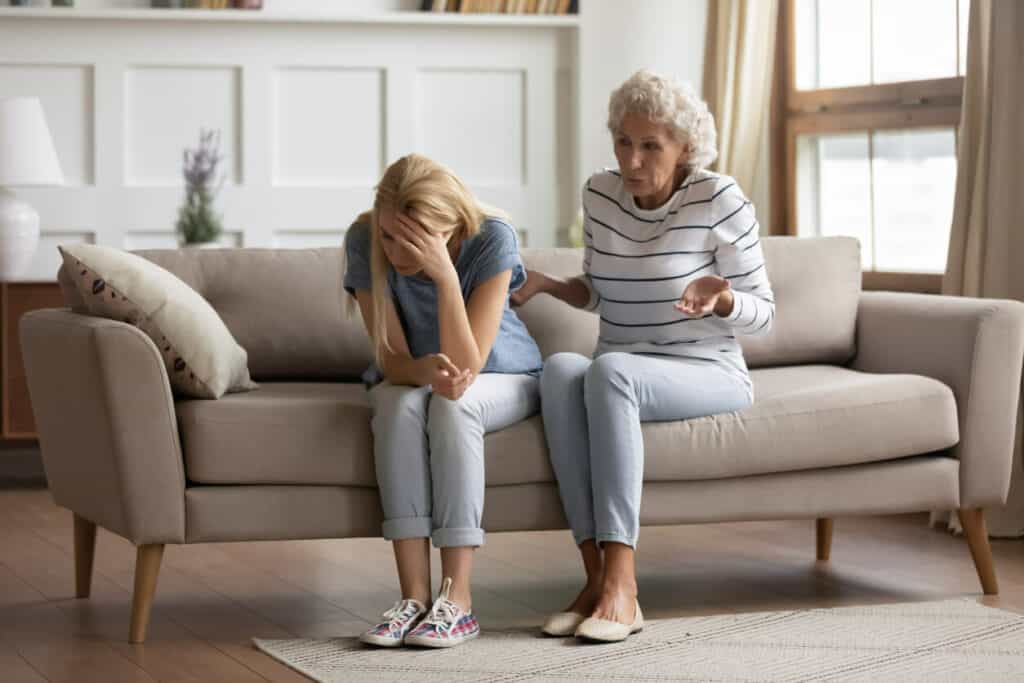
The repercussions of burnout are apparent to the caregiver and their health, and it impacts their mental, emotional, and physical state of health.
Here are the negative health consequences of stress and caregiver burnout by the numbers based on reports.
- About 32.9% of informal caregivers experienced mental or behavioral challenges like depression, anxiety, and substance use.
- An estimated 30.7% of unpaid caregivers had serious thoughts about suicide.
[Source: American Psychological Association]
- 21% of caregivers reported feeling alone.
- 23% of caregivers cited that caregiving has worsened their health.
[Source: AARP Caregiving in the U.S. 2020 Report]
- 45% of caregivers developed chronic conditions, such as heart attacks, diabetes, arthritis, cardiovascular disease, and cancer.
- 1 in 10 caregivers stated that supporting the physical care demands of their loved one led them to experience physical stress.
- The risk of heart disease increases by 100% in women spousal caregivers.
[Source: Today’s Caregiver Magazine]
- 55% of caregivers had at least one medical health condition, with sleep disturbances, depression, and chronic pain being the most prevalent ones.
- Approximately 59.8% of caregivers find that caregiving is a highly straining task.
[Source: California Caregiver Resource Centers]
The implications of burnout are not limited to the primary caregiver, their work, and their social life. The downsides affect the care recipient and their families, making it a public health issue.
The other effects of burnout include:
- Reduced or poor quality of care
- An increase in financial costs to the family resulting from the caregiver’s doctor visits or therapy sessions
- Relationship problems (burnout can strain relationships)
Burnout creates a ripple of adverse consequences that spill to other people and aspects of their lives.
Strategies to Avoid and Address Caregiver Burnout
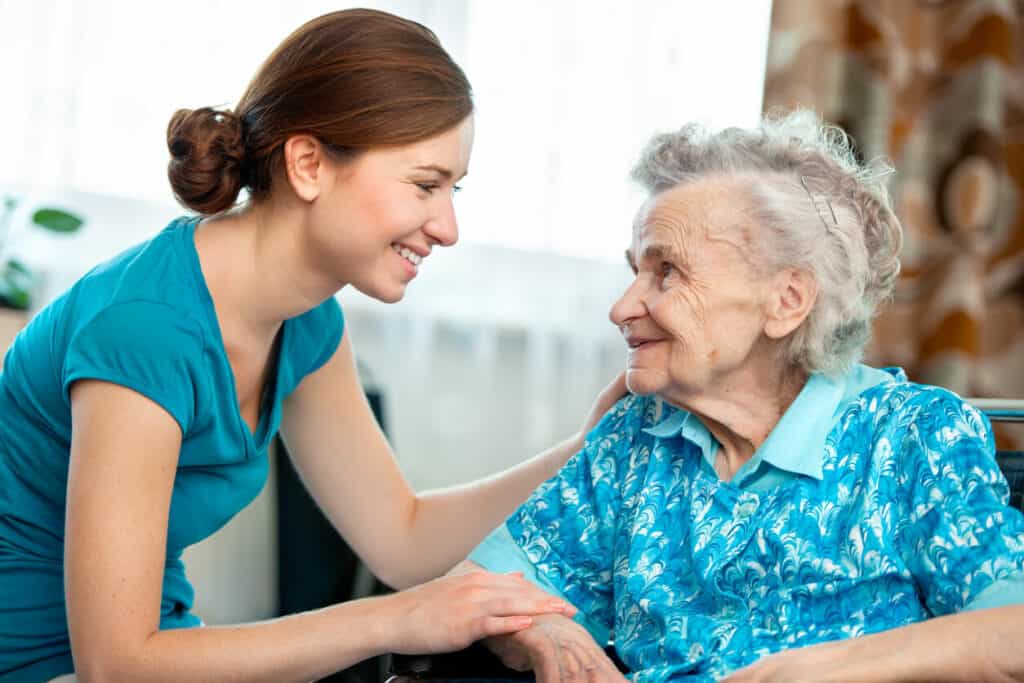
There are two ways to deal with caregiver burnout. First is to avoid it; second, if it does occur, address it.
Similar to other health concerns, caregiver burnout is preventable, which means you can stop it from happening by doing certain things. However, if you do reach a point where signs of burnout emerge, there are ways to resolve it.
Here are some effective methods to keep off burnout.
- Don’t set yourself up as a one-person team who can do everything alone. Recognize that you need others’ help to care for a loved one long-term.
- Don’t hesitate or feel shame about asking others for help. It’s not enough to realize that you need help. You need to be able to speak up and admit without guilt that you need a break. Research your options for respite.
Amy’s Eden offers respite care and various non-skilled care services for family caregivers who need extra hands caring for their loved ones.
- If the care demands of a loved one are higher than you can meet, follow a strategy of fresh staff every eight hours. Limit your care obligations to eight hours and hire a home care aide to provide care for the succeeding hours if necessary. This setup ensures that you don’t overdo things.
- Know when to move your loved one to a memory care facility or an assisted home. Sometimes, home is no longer an appropriate and safe place for your loved one because they don’t receive the care they need. Learn when to make the right choice of transitioning to a community or other senior care options to reduce the impact of caregiving on your health.
- Learn strategies to manage stress. Knowing and practicing an effective coping mechanism for caregiver stress will set you apart from burnout and stressed caregivers.
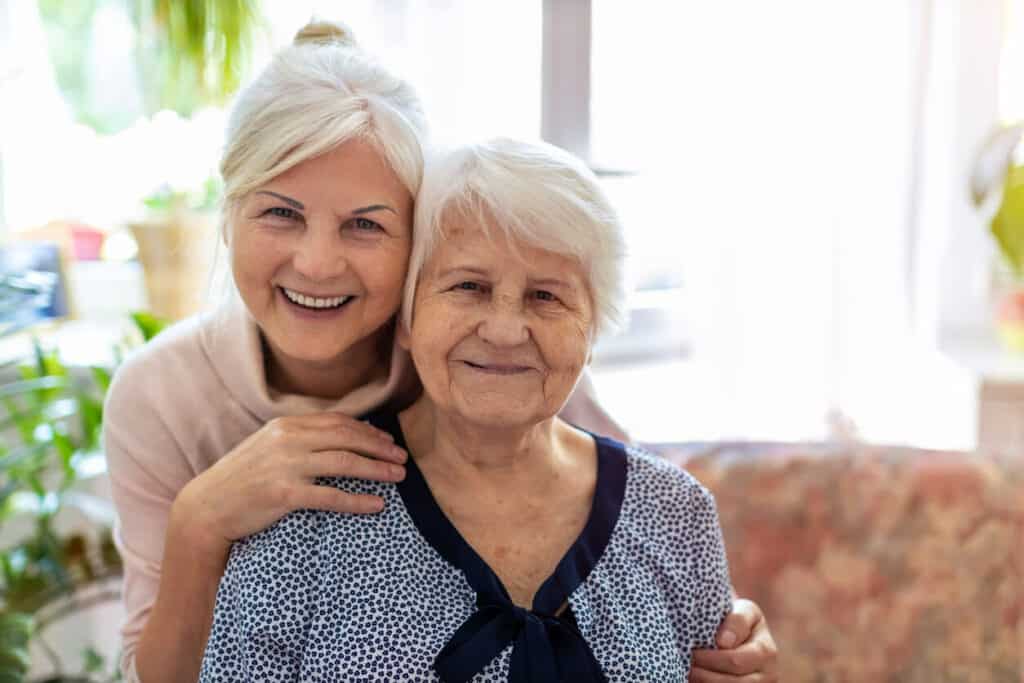
It could be an early sign of burnout when you start feeling overwhelmed and stressed with caregiving. Here are steps to resolve it.
1. Step back so you can see the broader picture
When you’re too focused on caregiving, you overlook what your body needs and the messages it sends you. Taking a step back will allow you a moment to have a macro view of your personal situation and evaluate your body’s needs.
2. Ask others for help
An exhausted caregiver requires rest. Be upfront with your senior loved one and family about needing help. Remember that there’s no shame in asking for help.
3. Be realistic about how much time and energy you can give for care
Your energy and time are your most essential resources. Like money, you’d want to manage how you spend them. If you can only accommodate 10 hours a week for caring for your senior relative without compromising essential aspects of your life, feel free to do so. Hire a caregiver if your loved one needs more hours of care and supervision than you can provide.
4. Leverage caregiver support network and community resources
If you know how and where to look, there are abundant support programs to overcome caregivers’ fatigue. Examples are local Area Agencies on Aging (AAA) and nonprofit organizations like Family Caregiver Alliance.
If you’re a professional caregiver, your pillar support system should be your organization. That said, before applying for a caregiving job, make sure the agency or company has designed caregiver wellness programs and resources to counter the symptoms of caregiver stress before they snowball into burnout.
Moreover, by joining a community of other caregivers, you get much-needed emotional and social support to empower you to handle the challenges accompanying a caregiver role.
5. Practice self-care
You can effectively manage caregiver stress symptoms and burnout by leading a positive lifestyle and doing things outside of caregiving to enrich your life, such as engaging in meaningful hobbies.
Once or twice a week, take time off from your caring responsibilities to recharge yourself and do something that makes you calm, happy, and centered.
The Role of Formal Caregivers in Supporting Family Caregivers
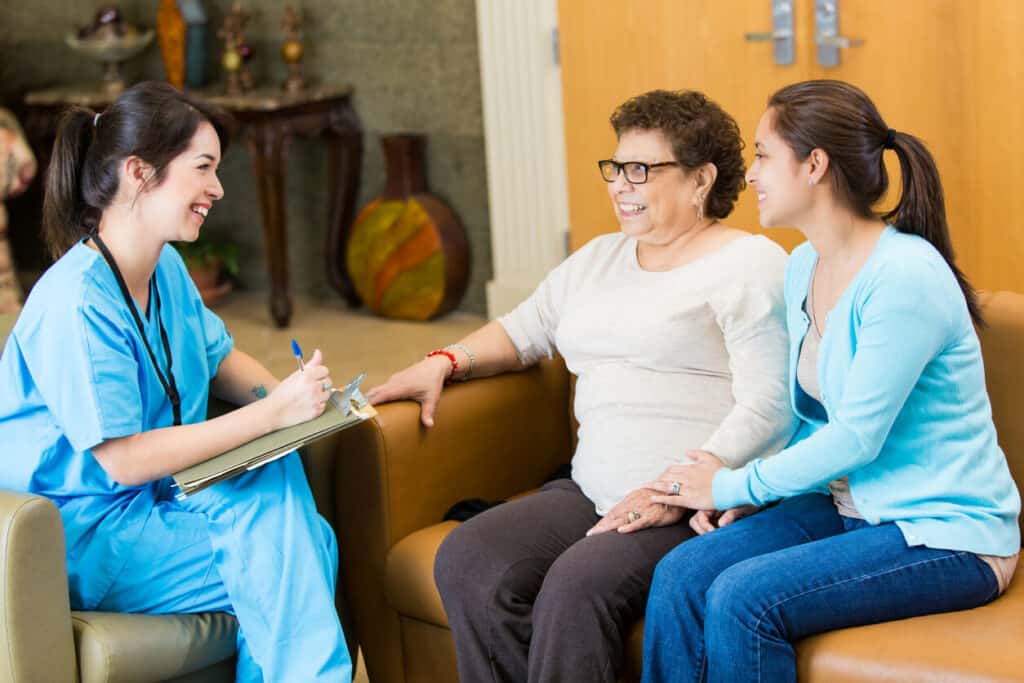
Collaborative care is pivotal in ensuring that the entire care team meets a patient’s changing and growing needs. In this care dynamic, the role of a professional or formal caregiver is essential to the wellness of the family or primary caregivers.
Working hand-in-hand with a trained caregiver will allow you, the family caregiver, to accomplish your daily obligations without jeopardizing your own well-being or giving up your social life.
Here are ways a professional caregiver can be a pillar of strength and support for volunteer or family caregivers.
1. Offer respite to maintain well-being
A few days of rest each week can help you recuperate from stress, fatigue, exhaustion, and other symptoms of caregiver’s syndrome and sidestep burnout. You can also use respite care services to reconnect with friends and check up on your social life.
2. Provide education and support
You can learn plenty of things from a trained caregiver, not just coping strategies and care skills training. A formal caregiver can give you ideas about financial assistance available for long-term care and health insurance options to cut your health care expenses. They can also provide emotional support for family caregivers and their families during difficult times.
3. Ensure that high-quality care is sustained throughout
As an important part of the care team, trained caregivers help patients take medication on time, eat a balanced diet, and exercise as often as possible. They also share the patient’s current health status with the nurse and physician for effective health monitoring. Simply put, they help sustain high-quality care throughout recovery and increase adherence to the doctor’s recommendations.
Professional caregivers are integral to patient recovery as they directly support your loved one for several hours daily. One of the challenges when hiring a professional caregiver is finding someone who is physically, emotionally, and mentally qualified to care for others.
Many caregivers today are unaware of their own health limitations. They look stressed and on the verge of caregiver burnout, disqualifying them from caring for others.
At Amy’s Eden, we promote positive workplace well-being by encouraging our caregivers to take frequent breaks to see through their own needs and restore their health to optimum levels. We recognize that caregivers are indispensable in helping seniors age in place independently. Hence, we give ample time for our care workers to heal themselves from stress.
Reversing the Effects of Caregiver Fatigue Syndrome and Burnout

Caregiver burnout is a prevalent public health issue. That’s why caregivers are often considered “secondary clients” due to the high health risks associated with caregiving, especially untrained and inexperienced family caregivers.
The impact of caregiving on family caregivers is health deteriorating because most didn’t learn any skills or stress management training. They don’t know how to cope with stress, navigate caregiving’s emotional, physical, and mental strains, and practice positive self-care.
You need to realize that caring for yourself and another person takes more than two hands. This is where hiring a certified caregiver is the best decision. They can help reduce the burden of caring responsibilities and prevent caregiver burnout among untrained family members.
Looking to hire a caregiver to provide respite and in-home care services? Contact us today to find a caregiver.

